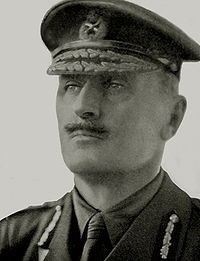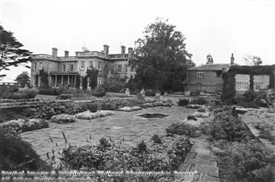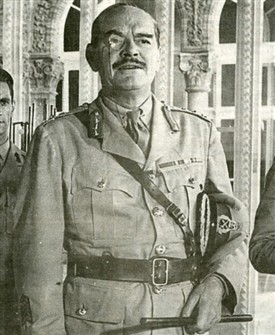ALLENBY, Edmund (Field Marshal) [of Southwell]

Field Marshal Allenby, photographed during the First World war

Brackenhurst Hall near Southwell

Field Marshal Allenby in later years
Born 1861, Died 1936
Field Marshal Edmund Henry Hynman Allenby was a native of Nottinghamshire, being born at Brackenhurst Hall near Southwell in 1861. Brackenhurst had then been the home of his mother's family for about 50 years.
Allenby was born at Brackenhurst on 23rd April 1861 (St.George's Day) and died in London on 14th May 1936. He is buried in Westminster Abbey.
Allenby entered the Army with the Inniskillin Dragoons in 1882 after studying at Sandhurst.
He was a column commander during the Boer War (1898-1902), a cavalry commander and later chief of the Third Army on the Western Front during the First World War before taking command of the Egyptian Expeditionary Force. In 1919 he was appointed high commissioner for Egypt, returning to England in 1922 after Egypt’s independence.
Allenby was a keen naturalist, with an absorbing interest in wild animals, birds and flowers. He first made a name for himself in South Africa, where he fought with distinction in the Boer War.
In August, 1914, he went to France in command of the Cavalry Division, subsequently commanding the 3rd Army, and in June 1917 he became commander of the Egyptian Expeditionary Force. On his appointment, the Prime Minister, Lloyd George, told Allenby he wanted Jerusalem as “a Christmas present for the British nation”!
The effect of Allenby’s arrival in the Middle East was electric. The Australian Official History of the War states: “He went through the hot, dusty camps of his army like a strong, fresh, reviving wind, the tall and massive figure and his forcible speech and his imperious bearing, radiated an impression of tremendous resolution, quick decision and steely discipline. Troops who caught only a fleeting glimpse of him felt that here at last was a man with natural qualities of a great driving commander, who would live among them and lead them.”
The Palestine Campaign fell into two phases – first the advance from Gaza to the capture of Jerusalem on 9th December, 1917 – the Christmas present the Prime Minister had asked for, secondly the great advance in the spring of 1918 to just north of Aleppo and Damascus, which marked the end of the Turkish resistance in October 1918.
The first phase was largely an infantryman’s battle, due to the difficulty of finding water for the Desert Mounted Corps, but in the second phase the cavalry went through in the coastal sector and the leading troops were 75 miles beyond their starting point after 36 hours. The speed of the advance from the original front line on 19th September just north of Jaffa to Aleppo on 26th October was some 400 miles in 38 days.
Allenby was created Field Marshal and enobled as 1st Viscount Allenby in 1919. From 1919 to 1925 he served as High Commissioner to Egypt, after which, in retirement, he became Rector of Edinburgh University.
On Thursday, 20th December, 1973, a memorial plaque to commemorate his birth was unveiled at Brackenhurst Hall, (which by then was the Nottinghamshire College of Agriculture) by Group Captain H.I. Hanmer, D.F.C., of Westhorpe Hall, Southwell, who served with General Allenby throughout his Palestine Campaign, 1917-18, as a pilot in the Royal Flying Corps. Also present were Colonel Hugh Tallents of Newark, and former Provost of Southwell, the Very Rev. Hugh Heywood, who also served with Allenby.
“Allenby”, said Group Captain Hanmer, “was a kindly man who took great interest in all around him, but he had a fierce temper, which when roused resulted in terrific explosions”. For this reason he was known throughout the Army as “The Bull”, and such was the awe felt for him that when he left his H.Q. to see his troops, the mystic signal B.L. preceded him, meaning “The Bull is Loose”, but it was usually sent as “B.B.L.”, the first could be easily interpreted!
The plaque was paid for and presented by the Brackenhurst Old Students’ Association, and Group Captain Hanmer said he was sure that, could Allenby have known his birthplace was to become an Agricultural College, nobody would have been more pleased, and he hoped that the plaque would be an inspiration and reminder to future generations of a great soldier, administrator and English gentleman.
If you can add any further biographical or service information, please do so via the 'Comments' link below.